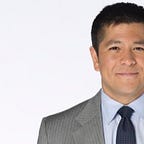Why We Binge
I’ve covered business news for nearly 25 years, but my dirty, little secret is: I’m a film and television junkie. A frustrated entertainment reporter. If I didn’t talk stocks for a living, I’d be covering studios and networks for “The Hollywood Reporter.” If they’d have me.
Luckily, we live in an era where media coverage is everyone’s business. Revolutions are ablaze at Netflix, Amazon, Spotify, and every cable network, movie theater chain and virtual-reality startup. It’s the most exciting time in media since the mass adoption of TV.
That’s why, I believe, it’s time for CNBC to more closely examine this changing media landscape — and NOT just through the eyes of the stock market. (We do that better than anyone every day of the week, on live TV and on-line.) I’m talking about a dissection of this new age as told by creators — the producers, directors and stars under whose feet the earth is shifting. Gather the most powerful, most savvy influencers in media and ask them two questions:
a) “What are you watching?”
b) “How are you making money?”
It’s the perfect thread for a CNBC audience: a viewer who appreciates a good business model but would really rather hear Brian Grazer dish about how “Empire” wound up on Fox — and not on Netflix or HBO. Sure, Amazon’s a great study in Return on Invested Capital, but isn’t the real question how in the world they now employ Woody Allen? Why is Jeff Bezos suddenly showing up (and winning) at the Golden Globes?
A lot has to happen for one of the biggest tech companies in the world to very quickly decide they want to make movies and TV shows. A maze of creative and economic decisions go into the pop culture we consume — decisions that flow from the C-suite to the soundstage. What does that new collision of commerce and art look like? That’s what BINGE is out to discover.
Some of these questions get asked on the morning shows, the late-night shows, in the Sunday arts section of the Times. But rarely within the framework of Hollywood as a business — run by people trying to create both art AND profits for their investors. Sondheim called this act “Putting it Together.” And as BINGE makes clear, it is as fascinating a human exercise as exists in the corporate world.
There’s a reason the old saying goes: if it weren’t a business, they’d call it “show show.”
We’re proud of Season 1 of BINGE. A small sampling of the chatter you’ll hear from our first 5 guests:
- Imagine’s Brian Grazer (Beautiful Mind, Parenthood) explains why the economics of network TV remain so compelling, despite the rise of streaming video. He discusses how Hollywood film actors slowly migrated to television, then cable, then over-the-top platforms (and why Gary Sinise was one of the first.) Grazer also runs through the merits of producing for Netflix, a platform that gives producers neither production “notes” nor traditional ratings results.
- Bravo’s Andy Cohen explain why “Real Housewives” marathons were the original binge-TV moment, and why the network first ran multiple episodes back to back, years ago. He tells us why he’d be okay if social media all went away one day, and we could “go back to living our lives” — and why he wouldn’t ask Donald Trump to appear on Bravo’s “Watch What Happens Live”.
- Producer Jason Blum (of The Purge, Paranormal Activity) talks the science behind those jump-out-of-your-seat moments in horror films, and what they’re called in Hollywood-speak. Blum explains how he changed the financial model of Hollywood by stripping out high salaries and actors’ perks — and created the “moneyball” of the film industry.
- Producer Jane Rosenthal (of Tribeca Films and Robert De Niro’s partner), goes in-depth on how Vine and Snapchat changed the modern film festival. She also evaluates the long-term worth of virtual reality — and whether that nascent technology will truly turn into a medium for filmmakers and producers.
- TV sitcom maestro Garry Marshall (of “Happy Days”, “Mork & Mindy”, and rom-com’s “Pretty Woman” and “Beaches”), tells us the exact moment in which to pitch executives with your proposed TV pilot. He talks about the network TV trend of bringing back old sitcoms — and which one of his own he’d revive. And hey, whatever happened to the catchy TV theme song?
And that’s just to start.
We live in a remarkable age, where the “on-demand” economy touches everything — including the delivery of movies, music and film. There’s an army of creators working harder and harder to satisfy that craving for consumers. CNBC is about to unpack some of the drama beneath that massive transition.
Why do we binge? Because we can.
We hope you’ll watch BINGE wherever and whenever you want. You won’t have to wait long for Season 2.
